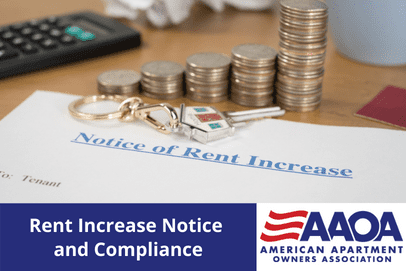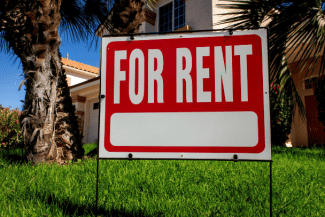Understanding a Rent Increase Notice and the Importance of Compliance

If you have a good relationship with your tenant, you may decide to postpone raising rent, but when other real estate factors start impacting your ROI, it may be time to reevaluate your monthly rent price.
Ready to get started? Keep reading and explore our guide to rent increase notices, compliance and more.
What causes rent to increase?
There are a variety of reasons why landlords choose to increase their rent prices — and you should understand exactly why you’re raising rent and by how much. Below are the top reasons a landlord or property manager may choose to increase rent:
- Staying competitive with the local market. If market rent prices in your area are heating up, it might make sense to increase your property’s rent to match it. One way to make a rent estimate is to use a rent comparison tool to compare similar rental properties.
- Property renovations or improvements. You may have invested in your rental property by adding new amenities (e.g., a pool, new appliances, in-unit washer and dryer, etc.) or renovations (e.g., upgraded flooring, bathrooms, etc.). This can raise the rental property value, which can be reflected in your monthly rent.
- Neighborhood upgrades. Are new businesses popping up nearby? Maybe additional public transportation options for improved walkability? Amenities, such as grocery stores, make the neighborhood more appealing to prospective tenants. It also indicates a growing local economy. Many of these factors can become a reason to raise rent prices.
- Increased insurance premiums, taxes and/or utilities. If bills are growing bigger, it may make the most sense to you to increase rent proportionately to keep up.
The ins and outs of a rent increase notice
Generally, a landlord can raise a unit’s rent price with a new lease agreement, if they give proper notice. Before a landlord can implement a rent increase, they must follow the rent increase notice requirements based on their state or local area’s laws.
How do you complete a rent increase notice? You must provide tenants with a written notice to inform them that their monthly payments will be increased. Also called a rent increase letter, this notice must be submitted to the tenant within a certain number of days (determined by local law, state law, rental property and type of lease agreement) to provide them with enough time to make a decision. Proper notice can vary between 30 to 90 days. Remember, a year-long lease has different requirements from a month-to-month lease.
Once given proper notice, the tenant may choose to accept the rent increase, reach out to negotiate or inform whether they will be leaving after their lease end date to a new property.
To ensure due diligence, each landlord is recommended to have a go-to template and system in place to inform tenants about a rent increase. It can also help improve the landlord-tenant relationship as it increases consistency and sets expectations.
Does a rent increase affect the security deposit?
The answer is yes and no. Depending on the rental property’s location, some states have a set maximum amount that a landlord can charge a tenant for the security deposit based on the rent.
If the rent has increased, the landlord can ask for an additional payment to bring the security deposit up to the new rent amount. This would be due at the same time that the new rent takes effect.
However, a landlord can also choose not to ask for another security deposit payment.
Ensuring compliance with state laws and regulations
Some properties are subject to rent control laws. You must ensure that the property remains compliant in this case. Similarly, there are landlord-tenant laws in many states that dictate how much rent can be increased.
For example, in California, the rental unit might be subject to statewide rent control, AB 1482 (also known as the Tenant Protection Act) or the state’s anti-price gouging law.
AB 1482 officially took effect in California on January 1, 2020. It applies to some residential rental properties, including those that may not be covered by a rent control ordinance, to impose a rent cap. It also specifies “just cause” eviction requirements for residents that have lived in a rental property for a certain period of time. There are exemptions and if you have a rental property in California, reach out to a law professional for any questions or concerns.
If your California property is subject to a local rent control ordinance or AB 1482, a rent increase must comply with those regulations. Meanwhile, the anti-price gouging law limits the amount the rent can be increased. These measures help to protect affordable housing in the state.
Interested in more information? AAOA provides additional resources for tenant-landlord laws in the states listed below:
Important note: Always be sure to check your state and municipality laws and speak with a law professional to confirm that you’re within your rights to increase rent.
Get the solutions and resources you need by joining AAOA today!
Whether you’re a new landlord or an experienced real estate investor, AAOA was founded to help streamline your business. From industry-leading tenant screening services, tenant background checks, landlord forms and other rental tips and tricks, we’ve got you covered.
Gain instant access to all of the above comprehensive resources and solutions once you become a member.
Excited to get started? Join AAOA today.
The information provided herein is for advisory purposes only and AAOA takes no responsibility for its accuracy. AAOA recommends you consult with an attorney familiar with current federal, state and local laws.















 Accessibility
Accessibility